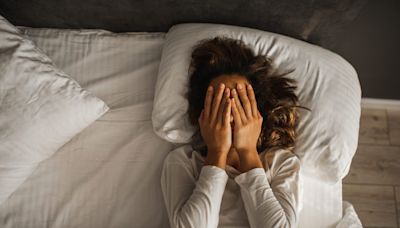Search results
Mental and physical state of negative expectation
- Anxiety is both a mental and physical state of negative expectation. Mentally it is characterized by increased arousal and apprehension tortured into distressing worry, and physically by unpleasant activation of multiple body systems—all to facilitate response to an unknown danger, whether real or imagined.
www.psychologytoday.com/us/basics/anxiety
People also ask
What is the difference between fear and anxiety?
Is anxiety a disorder?
Is anxiety a physical or mental state?
What is anxiety in positive psychology?
Anxiety is meant to capture attention and stimulate you to make necessary changes to protect what you care about. Occasional bouts of anxiety are natural and can even be productive.
- Treatment of Anxiety
Psychology Today: Health, Help, Happiness + Find a Therapist
- Therapy for Anxiety
Explore the benefits and effectiveness of therapy for...
- Natural Approaches to Anxiety
Randomized controlled studies of people with generalized...
- Panic Attacks
Panic attacks often begin with a sudden sense of extreme...
- Vulnerability to Anxiety
Researchers believe that anybody can experience a bout of...
- Anxiety: Is It an Illness
Anxiety is a normal, necessary, and useful mental state of...
- Signs and Symptoms
Anxiety is a response originally designed to promote...
- Treatment of Anxiety
Anxiety is a response originally designed to promote survival in a world of danger. The brain center that regulates such basic behaviors as eating and sex (the hypothalamus)...
- Overview
- Anxiety
- Tips for anxiety
- Symptoms & Causes
This article provides information about anxiety, its causes and symptoms. It also gives tips on how to cope with anxiety such as relaxation techniques, mindfulness exercises, breathing exercises and keeping a diary of your feelings. The article suggests seeking support if the anxiety is affecting daily life or causing distress.
Anxiety is a feeling of unease, like worry or fear, that can be mild or severe. It makes heart race and causes changes in behavior. When it becomes a problem, worries are out of proportion with harmless situations and interfere with daily life.
Practicing relaxation, mindfulness or breathing exercises regularly helps reduce tension and focus awareness on the present moment. Keeping a diary of activities and feelings can help identify what's affecting you. Setting specific "worry time" each day focuses on other things instead of overwhelming worries all day long. Avoiding situations keeps ...
Anxiety affects everyone differently and shows as changes in body such as constant worry or avoidance behaviors; physical symptoms include restlessness, headaches, sweating etc.; mental health influences such as upbringing environment events temperament affect our mental health; sometimes difficult to know what is making us anxious which adds stres...
Anxiety is an emotion which is characterised by an unpleasant state of inner turmoil and includes feelings of dread over anticipated events. [ 1][ 2][ 3] Anxiety is different from fear in that fear is defined as the emotional response to a present threat, whereas anxiety is the anticipation of a future one. [ 4] .
What is anxiety? Anxiety is what we feel when we are worried, tense or afraid – particularly about things that are about to happen, or which we think could happen in the future. Anxiety is a natural human response when we feel that we are under threat. It can be experienced through our thoughts, feelings and physical sensations.
Anxiety is an emotion characterized by feelings of tension, worried thoughts, and physical changes like increased blood pressure. Anxiety is not the same as fear, but they are often used interchangeably. Anxiety is considered a future-oriented, long-acting response broadly focused on a diffuse threat, whereas fear is an appropriate, present ...
Apr 25, 2023 · Anxiety is a feeling of nervousness, unease, or worry that typically occurs in the absence of an imminent threat. It differs from fear, which is the body’s natural response to immediate...
- www.homerry.net/anxiety/depression· Deal
AdAnxiety vs. Depression: Know - Anxiety Depression Symptoms
Learn Effective Treatments to Reclaim Your Mental Well-Being Today. Best Online Anxiety and Depression Treatment You Can’t Miss 2024.
Unique Arts and Healthy Bodywork Classes for Holistic Health & Wellbeing. What's On-line? Intercultural Roots offers a diverse range of arts for health and wellbeing online courses



